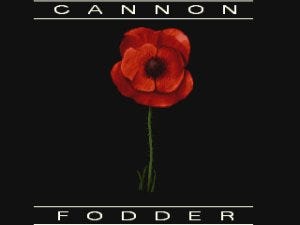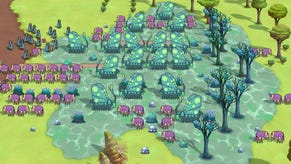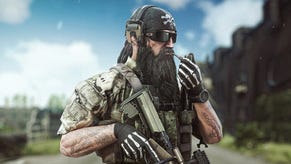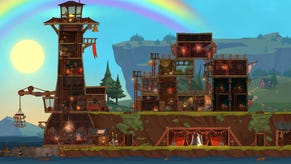Retrospective: Cannon Fodder
I still remember a pub-based conversation around the time of its release. It involved the relative merits of Syndicate with Cannon Fodder. We loved them both, clearly. Everyone loved them both. But were we to call, we preferred Syndicate. But perversely, everyone also agreed that in the terms we were used to thinking of, Cannon Fodder was the better game. They're an unusual pair, you see. Despite the fact they shared a central mechanic – that is, they were both mouse-driven shooters where you controlled a small group of soldiers going about their missions – and came out within a similar time-frame, I don't recall any direct comparisons in the press. The only reason I can think of is that they felt so radically different.
Syndicate was a worse game, but its appeal was that it was a better something else – I wrote elsewhere that Syndicate was the first step on the road to Grand Theft Auto, and it's these elements which were particularly revelatory. The living city, the freeform hyperviolence, the complete amorality... for our teenage minds, it was as cheap a transgressive thrill as listening to that first Rage Against the Machine or sneaking into Reservoir Dogs or whatever else was happening around the time. In comparison, Cannon Fodder just had good, old-fashioned game-design. Levels were clockwork perfect constructions with every element obviously carefully considered. While only rarely as restrictive as a true puzzle game, there was an elegance to them which the pulsing and unpredictable Syndicate could never match.
There was another key difference, and the one why I'm writing about it on this day in particular. While Syndicate ethics were gloriously warped, Cannon Fodder was a profoundly moral game. It managed to be explicitly anti-war while still showing a respect for the men who fought and died through the years. It was, in that old-fashioned way, decent. It didn't do it sombrely – irreverence was the one constant throughout Sensible Software's gloriously diverse games – but it's points were absolutely clear. In fact, through its black comedy, there was even a rage and disgust at how humans were treated.
The title says much. Almost all wargames have a title which directly glorifies war. Sure, Infinity Ward's memorable sections like the Stalingrad level where you aren't issued a gun are harsh as mainstream gaming gets, but the game's still called bloody “Call of Duty”. Medal of Honour. Brothers in Arms. Conversely, Cannon Fodder notes that rather than medals and honour, war is about people dying unfairly and stupidly. This is not a glorious endeavour. War is about waste.
But, as Stuart Campbell once noted, the irony was that Cannon Fodder did more than any other game before and since to actually treat its tiny participants as anything but Cannon Fodder. Rather than an endless supply of soldiers to throw into the fray, Cannon Fodder offered a large but not inexhaustible supply of men. The between levels you're presented with a screen of soldiers queueing over the hill, with men walking off the left to replace casualties. More importantly, each of the characters had a name, which inevitably humanised them. Even more importantly, whenever anyone died, a gravestone was added to the hill. By the end of the game, that grassy mound was a genuine cemetery. Look what you made.
The theme tune – neck and neck with Still Alive for the title of best in-game song ever, for my money – set the tone perfectly. A light reggae skank carries its direct gallows humour: “War's never been so much fun”. It states it with something that sounds less like irony than just plain scornful sarcasm. There's a moment which epitomises it towards the close, where we cut between kill him with your gun/dying in the sun/kill him with your gun/dying in the sun” repeatedly, with ever growing tension, before a final pay-off of a drawled “so much fun”.
War, yeah. So Much Fun.
And since this post has been sponsored by the word irony, there was an extra one – it ended up causing a genuine press controversy. Originally the game was planned to be a simple black box with a poppy on the cover. The British Legion objected – though, of course, a poppy is a poppy and people could do what they want with it. The Star got involved, claiming the game was an insult at our war dead, exploitative and all the rest. Which is so far from the mark, it's genuinely sad – that every other drum-beating piece of propaganda for the joys of the military has passed without comment, the one which actually had the strength of character to actually engage with the issues was slaughtered. A last minute, hilariously ugly replacement cover of a bloke in camouflage was used instead. In fact, the camouflage is appropriate – it fades into the background of my memory. When I think of Cannon Fodder's box, my first thought is always the poppy one. It's arguably the greatest videogame cover that never was, because Sensible, even though they were funny, realised that didn't stop them from trying to be fearless and frank too.
Sensible aren't around any more, so I think of them. And I think of Cannon Fodder. And when I think of Cannon Fodder my thoughts bounce between the intricate and brilliant game itself and all the issues it quietly touched on. And I think back to all the dead soldiers who fundamentally died to let me play it and write this.
Remembrance Day always makes me sad, because every year you see less and less soldiers at the Cenotaph as age takes its inevitable toll. Soon, they'll be none and the remembrance will become even more vague – and, part of me fears, without living artefacts, we'd end up forgetting what we learned in the first and second world wars. That, as I posted it on a wi-fi on a train, a good chunk of the train carried on chatting through those two minutes, including someone making an annoncement about the food trolley coming through, makes me increasingly sure of it. To keep those lessons alive, we have to turn to art. History lessons don't work. People never listen to lessons. We need art to make people feel about things which is absolutely essential to feel about it. Cannon Fodder, in its own way, realised this.
(In passing, remember that the arranger of “War's Never Been So Much Fun”, sound-maestro Richard Joseph passed away this year and in the two minute's that's happening as I'm posting this, I'll be thinking of him.)
Cannon Fodder is a bit of an old soldier too. Where Syndicate lead to a different world, Cannon Fodder was the end of one. There's never been anything similar since and no-one's taken its ideas and done anything further with it (Bar, of course, its sequel). While it's a high-point in the British game design of the period, it's in the past. But it tried, and was great and that's all that matters.
And, for me, in all these things, it's important to remember.









